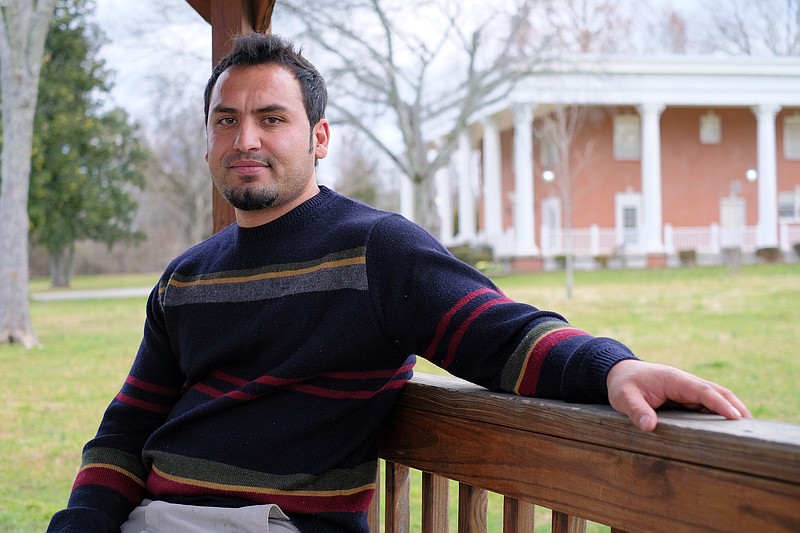It was mission impossible, he wrote. Or, perhaps more accurately, mission suicide.
In a matter of days, his country had fallen to the Taliban, a reality Khial Shinwari never expected. He saw the horror of the evacuation from Afghanistan's military base. The Afghan air force colonel had gone to bed one morning after a night mission only to be awakened a few hours later to find people around him running, leaders with stoic faces.
Kabul had fallen.
"It was like the end of the world. Aircraft were flying from the taxiways, [the] opposite direction from the runway," Shinwari said. "It was the end of the world."
The 35-year-old Afghan military leader was miles from his wife and two young children. Leaving the military base to get them was too risky. Taliban fighters were targeting air force workers, Shinwari said. Kill the pilots, control the sky.
More than a decade earlier, in 2009, Shinwari was trained to fly planes in Oklahoma, including Alenia C-27s and Cessna 208s. Later, Shinwari learned to fly C-130s and was the first Afghani pilot to do so in his country.
He was drawn to the sky even as a child.
"When I was looking at airplanes, I just loved airplanes," he said. "And I was always wishing and hoping ... I could become a pilot. So I did follow my dreams. And that's how I ended up. I was the only member of my whole family to be in the air force and to be a pilot."
(READ MORE: Silverdale Baptist turns coffee profits into help for Chattanooga-area ministries)
By August 2021, he was one of the few pilots remaining in the country. He would not leave without his family, even as the Taliban controlled more and more territory.
Then the mission came: There were 130 people in Kandahar, the city where Shinwari was born, holding out hope for an evacuation.
"I suddenly decided, like if anything happens to me or my airplane, it's only me. It's only one family," Shinwari said. "If I save those 130 people, that's 130 families. So I decided to go back. I had the honor of being the first pilot and being the first one to fly in Afghanistan with [a] C-130 and also being the last one to fly in Afghanistan, which was sad and painful."
He flew at night, the safest time. The mission impossible, or mission suicide, as Shinwari described it on Facebook, was a success.
But by the time he returned to Kabul, he faced another impossible mission. U.S. forces and friends were urging him to leave. But he thought of his wife, his daughter and his son, then less than 2 months old.
"I just looked at those American friends and I told them I'm not leaving without my family. And they told me the only priority is you, and we have to take you, and I told them I cannot do it. I have to stay here," he said.
Shinwari stayed on the base for several more days, until miraculously his family was brought to the gates and let inside. They left quickly, with Shinwari carrying only the clothes on his back. Passports, mementos, were left behind.
The family moved from Afghanistan to Qatar to Germany to the United States in September and finally to Chattanooga in October.
The transition has been difficult, Shinwari said. He works as a technician in a factory, trying to earn enough to support his family. While he knows English, his wife does not, and he is teaching her how to drive, too. Finding a job was tough, he said, and finding an apartment without a job or credit history was difficult, too.
(READ MORE: Praying for the incarcerated, Chattanooga group raises awareness during Lent)
Shinwari entered an American refugee system that is disjointed and cumbersome, said Marina Peshterianu, associate director of Bridge Refugee Services. Many refugees come to America and take the first job they can get to support themselves or their families, she said. The process of being recertified in whatever professional field they were in before is difficult, she said, especially if they need to take classes to re-earn their credentials.
"This is why displacement and war is so bad," she said.
Peshterianu said 26 Afghani refugees came to Chattanooga following the evacuation of Afghanistan. More than 600 came to Tennessee, with the majority of them being settled in the Nashville area.
Shinwari is hoping to fly again, with cargo planes or an airline. He is motivated and is getting a lot of help, Peshterianu said.
The city of Chattanooga is creating the Office of New Americans to help new residents, said Joda Thongnopnua, chief of staff for the municipality. The office will be under the Office of Equity and Community Engagement and will assist with things like making documents accessible in a variety of languages and ensuring city services are available to people of various documentation statuses, Thongnopnua said.
Part of the office's work will involve connecting new residents to existing resources, as well as doing things only the government can do, Thongnopnua said, such as helping create means of identification for people who do not have those because of different life circumstances.
Contact Wyatt Massey at wmassey@timesfreepress.com or 423-757-6249. Follow him on Twitter @news4mass.
